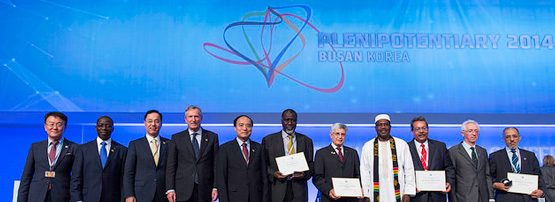
The first Friday of Plenipot began early, but not as early as hoped. ITU Secretary General, Hamadoun Touré, was late arriving for a meeting with ‘Civil Society’ which included the technical community. Touré fell foul of Busan’s infamous traffic, apparently.
Only a handful attended, but Touré promised more meetings would be scheduled with Civil Society before the end of the three weeks.
He declined an invitation for Secretary General Elect, Houlin Zhao, to attend these meetings as a demonstration of commitment to future collaboration with the group. This was done on the basis of operational needs, so it’s not clear if Zhao will endeavour to maintain the same level of collaboration at future world conferences.
Touré thanked bestbits for its open letter to him before the Plenipot and thanked ISOC also for its statements, noting that the tone has changed: “You are now telling me what to do rather than what not to do”.
There are so many things that I should not do, he said, it is better to tell me what you think I should do. He also offered a little advice, telling Civil Society what it should do. Do not accuse ITU of not being open, accuse your Member States, he said reminding us that he runs a Secretariat, which acts as directed by its members. Touré also pointed to his blog post about Civil Society participation in ITU events, which was published the day before.
Meanwhile, ITU elections continued, with a final result for the position of Deputy Secretary General finally being resolved after four rounds. Current ITU-T Director, Malcolm Johnson, finally winning over the last candidate standing, Shola Taylor, of Nigeria.
Directors of the three Bureaus were all elected in a single voting sequence. The only position that was contested was the T Sector (standardization) left vacant with no sitting candidate as Johnson has completed his maximum two terms in the role.
- Director of the Radiocommunication Bureau – François Rancy (re-elected for a 2nd term)
- Director of the Development Bureau – Brahima Sanou (re-elected for a 2nd term)
- Director of the Standardization Bureau – Chaesub Lee
The election of Chaesub Lee of Korea means our region has two of the top five executive positions, Europe another two, with the final spot filled by the African region.
The Plenipot is also discussing whether to continue with the proposal made four years ago to restructure the treaty level texts that form its basic constituent documents, the ITU Constitution and Convention. Each time these texts are edited they must be resigned and each Member State must accede to them – usually requiring an Act of Parliament. Quite apart from the risk that some Members may choose not, or be unable to, it is an inconvenience at the least.
However, restructuring these documents in a way that separated out those administrative elements that do sometimes change has proved more difficult than was first hoped and most Member States are now trending toward proposals to abandon the idea.
Member States are considering the matter of the World Conference on Information Technology (WCIT). Last held in 2012 to review the International Telecommunications Regulations (IRTs), the conference was extremely divisive for the Union and attracted a great deal of bad publicity as well. Naturally, there’s some reluctance to re-open the matter so soon after the ITU has barely begun to heal. The ITRs do not come into force until next year, and a good proportion of those who participated, refused to sign.
However, others (presumably those who did not get what they want from the review) argue that the 24-year period between the last two times this document was discussed is too long.
Despite the significant financial burden another world conference would place on an already struggling UN agency, there are a number of proposals to schedule a review – even as early as 2017. It seems likely, however, that an agreement will be reached to stage a WCIT in 2020, which would be eight years after the last review. A decision will be made by Wednesday, 29 October.
Finally, the third session of the Working Group of the Plenary, which is home to the most contentious Internet-related matters, met and formed another Ad Hoc group for discussion. Proposals to revise Resolutions 101, 102, 133, and 180 were introduced as were four proposals for new resolutions.
All were placed under the expert Chairmanship of Italy’s Fabio Bigi. More detail on these proposals will be posted as they come up for negotiation in the Ad Hoc sessions which are likely to stretch over several days as the Member States battle their way through what are significant and often controversial revisions. As you can see from the list below these are matters of significant importance to APNIC membership as they could directly impact on matters such as address delegation and network management.
RESOLUTION 101: Internet Protocol-based networks
Documents:
RESOLUTION 102: ITU’s role with regard to international public policy issues pertaining to the Internet and the management of Internet resources, including domain names and addresses
Documents:
RESOLUTION 133: Role of administrations of Member States in the management of internationalized (multilingual) domain names
Documents:
Resolution 180: Facilitating the transition from IPv4 to IPv6
Documents:
Proposed new resolution “Voluntary guidelines and best practices for designing, installing and operating Internet exchange points (IXP)”
Proposed new resolution “Bridging the international connectivity divide”
Proposed new resolution “Preserving and promoting multilingualism on the Internet for an integrating and inclusive information society”
Proposed new resolution “ITU’s role in realizing Secure Information Society”
The views expressed by the authors of this blog are their own and do not necessarily reflect the views of APNIC. Please note a Code of Conduct applies to this blog.
